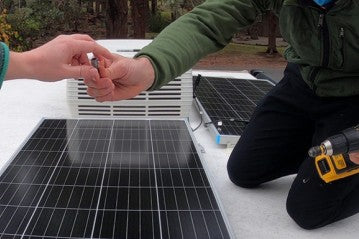
In today's world, sustainable living and renewable energy sources have become increasingly important. As the demand for clean energy rises, homeowners are searching for ways to reduce their carbon footprint and save money on energy bills. One excellent option that homebuyers should consider is installing solar panels when building a new home. Solar panels offer numerous benefits, ranging from environmental advantages to long-term financial savings. In this article, we will explore the reasons why homebuyers should seriously consider integrating solar panels into their new home construction.
I. Environmental Benefits of Solar Panels
With the increasing concerns about climate change and the depletion of non-renewable resources, it is crucial to embrace sustainable practices. Solar panels provide an excellent way to reduce our dependence on fossil fuels and lower carbon emissions. By harnessing the power of the sun, solar panels generate clean, renewable energy without contributing to air pollution or greenhouse gas emissions. Incorporating solar panels into a new home demonstrates a commitment to the environment and contributes to a greener future.
A. Reduced Carbon Footprint
Solar panels help homeowners reduce their carbon footprint significantly. Traditional electricity generation relies heavily on fossil fuels, which release harmful greenhouse gases into the atmosphere. By utilizing solar energy, homeowners can significantly reduce their reliance on fossil fuel-generated electricity and, in turn, reduce carbon emissions. By choosing solar panels for their new homes, homebuyers are actively taking a step towards sustainable living.
B. Conservation of Natural Resources
Solar energy is a renewable resource, unlike fossil fuels, which are finite and non-renewable. By using solar panels, homeowners tap into an abundant source of energy that will never run out. Solar panels provide an opportunity to conserve precious natural resources while also reducing the strain on the environment caused by mining and extraction operations.
II. Financial Advantages of Solar Panels
Beyond the environmental benefits, integrating solar panels into a new home construction can also yield significant financial advantages for homebuyers.
A. Reduced Energy Bills
One of the most significant financial benefits of solar panels is the potential for reduced energy bills. Solar panels generate electricity that can power your home's appliances, lighting, and heating systems. By utilizing solar energy, homeowners can significantly reduce their reliance on grid electricity, resulting in substantial savings on monthly energy bills. Over time, these savings can add up, making solar panels a sound long-term investment.
B. Increased Home Value
Solar panels can enhance the value of a home. Studies have shown that homes equipped with solar panels tend to sell faster and at a higher price than homes without solar installations. Prospective homebuyers recognize the long-term cost savings associated with solar energy and are willing to pay a premium for homes that already have solar panels installed. By incorporating solar panels into their new home construction, homebuyers can increase their property's value and potentially enjoy a higher return on investment.
III. Energy Independence and Resilience
Another advantage of integrating solar panels into a new home is the potential for energy independence and resilience.
A. Protection Against Rising Energy Costs
Traditional energy costs are subject to fluctuations based on factors such as global oil prices and political instability. By generating your electricity through solar panels, homeowners can shield themselves from these external factors and insulate themselves from rising energy costs. With solar panels, homeowners can lock in a fixed energy price, providing peace of mind and stability in an uncertain energy market.
B. Power During Outages
Solar panels combined with battery storage can provide a reliable source of power during grid outages. By having an independent energy source, homeowners can ensure that their essential appliances and systems, such as refrigeration and lighting, continue to function even during power disruptions. This enhanced resilience can be particularly valuable in regions prone to severe weather events or areas with an unreliable power grid.
Conclusion
When building a new home, it is essential to consider the long-term benefits and impact on both the environment and personal finances. Solar panels offer an excellent opportunity for homebuyers to embrace sustainability, reduce their carbon footprint, and save on energy bills. By harnessing the power of the sun, homeowners can contribute to a greener future while enjoying the financial advantages of reduced energy costs and increased property value. Integrating solar panels into new home construction not only demonstrates a commitment to environmental stewardship but also provides homeowners with energy independence and resilience. As solar technology continues to advance and become more affordable, the decision to go solar when building a new home becomes increasingly compelling. So, if you're planning to build your dream home, don't forget to consider the power of solar panels.

0 comments